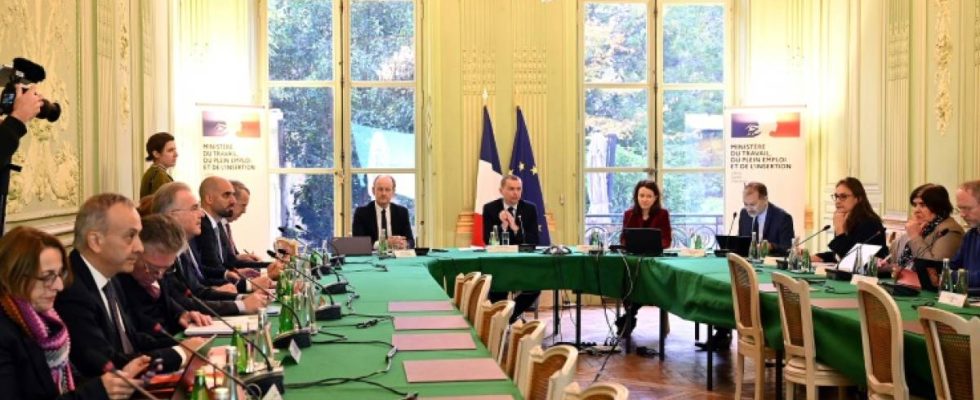French Minister of Labor Olivier Dussopt during a meeting with French unions on the reform of unemployment insurance, November 21, 2022 in Paris (AFP / Bertrand GUAY)
Difficult negotiations between unions and employers on the conditions of compensation for the unemployed from 2024 were suspended Thursday evening and will resume Friday morning, with no guarantee of success.
The draft agreement, submitted by the employers ahead of this session, “is a first version and I see that, really, it is difficult”, declared the CFDT negotiator, Olivier Guivarch, after around seven hours of discussion. ‘trades.
“It will be decided in the final session” on Friday, he added, explaining that “the CFDT is still looking for a way through”.
“The more it advances, the narrower the passageway. It’s no longer a mouse hole, it’s the eye of a needle,” commented his FO counterpart Michel Beaugas.
The employers’ text “did not move one iota” at the end of Thursday’s negotiation session, noted at the end of the evening the CGT negotiator Denis Gravouil, who had earlier described the document as “provocation “.
The management side, which did not speak to the press, has undertaken to present a new version of its project on Friday morning, according to union negotiators, who predict telephone exchanges during the night.
The draft agreement, unveiled by the AEF agency and consulted by AFP, plans in particular to “adjust certain compensation rules to better take into account the situation of the most vulnerable groups”. This includes lowering the minimum affiliation condition allowing entitlement to be granted, from six to five months, or “adjusting the rules relating to the degression” of allowances for high incomes. , by making it apply to those under 55 and not 57.
But the CFE-CGC warned that it would not sign if the degression remains in the text.
Other measures of this agreement planned to initially last three years (four in the employers’ project) concern in particular the rules of compensation in the event of resignation, or aim to promote the return to employment of seniors.
– “Double difficulty” –
The project also provides for an employer contribution rate reduced to 3.95% of payroll, in particular with the elimination of a temporary contribution of 0.05% imposed in 2017, a measure demanded by Medef. The text also intends to “adjust” the bonus-malus system, a system criticized by employers which increases the contributions of bosses who use short contracts more than the average.
The unions do not necessarily reject the principle of reducing employer contributions, but want improvements for the rights of the unemployed.
The government, which gave the social partners until November 15 to reach an agreement, will take control if they do not reach a compromise.
The executive could refuse to validate an agreement based on macroeconomic forecasts from Unédic which it contests. According to several union representatives, the government is counting on failure.
The executive closely framed the debates in a document sent at the beginning of August to the social partners: no return on the 2019 reform, which notably tightened the conditions of access to compensation for the unemployed, nor on that of 2023, which modulates the conditions of unemployment insurance according to the labor market situation and has reduced the duration of compensation by 25%.
Additional financial complexity, the executive has planned additional draws on unemployment insurance revenues to finance support and training measures for the unemployed.
These levies pose “a double difficulty”, indicates the draft agreement, invoking “a question of principle” and in relation to Unédic’s debt reduction objectives.
In February 2019, the latest negotiations on unemployment insurance ended in failure: the social partners held the executive responsible, which had, according to them, presented them with an impossible equation.
In the evening, more than a hundred demonstrators came to the area around Unédic, at the call of the CGT, to defend the rights of the unemployed, and those of intermittent workers in the entertainment industry, whose compensation conditions must be validated in the overall negotiation.

